How to Fix Thermal Trip Error on Windows 11/10
Every CPU is designed to operate within specific temperature limits. Whenever the CPU temperature reaches a certain zone, it automatically trips and the system automatically shuts down/restarts. However, if you see this error message during system boot, there are some solutions you can try. Read on and implement these simple fixes to resolve the issue.
NOTE——
This processor thermal trip is designed to protect your system. When you perform processor-intensive work for an extended period of time, the processor may have reached its limits and activated a thermal trip. We recommend that you double-check these solutions and consult a technician if this happens repeatedly.
Fix 1 – Basic Troubleshooting Steps
There are certain checks you can perform to check if this is a hardware issue.
A.Check the fan
The fan is the main part of the cooling system. If the fan stops working, the CPU and other components will overheat and cause a processor thermal trip.
1. Shut down your system. Make sure your power switch is also off.
2. Then, carefully open the back cabinet.
3. Check the fans on the CPU, GPU and power supply unit. Look carefully for any obstructions on the fan blades.
3. Now, when the case is open, click on the power button to start the system.
Normally, the fans on the PSU and CPU should start spinning as soon as the computer starts booting. If you notice that the CPU fan is not spinning during system startup, there may be some problem and you should consult a computer technician.
The fans on gaming laptops are usually located on the back. Therefore, you should not place your laptop on a solid surface (like a table, desk, etc.). You can use your laptop's cooling pad to regulate the ambient temperature more effectively.
B. Environment
In addition to fans, the environment in which you use your device also plays an important role in thermal management. You should keep your system running in a cool, well-ventilated environment. An excessively hot environment can cause the processor to overheat.
Fix 2 – Kill Background Processes
Playing games while heavy tasks are running in the background can put a lot of stress on the CPU, causing it to trip due to excessive temperatures.
1. Click the Ctrl Shift Esc key at the same time to call the Task Manager.
2. Once opened, check the CPU tab and look for processes with very high CPU usage.
3. If you can find any such process, select the task and click "End Task" to kill it.
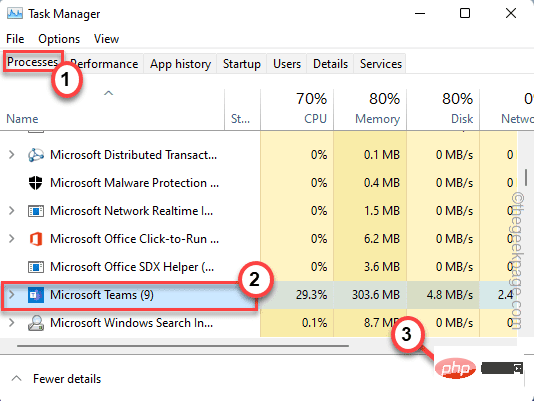
Make sure that any unnecessary processes are not using a lot of CPU processing power.
Close Task Manager when finished. Now, play games or do anything. You will no longer see the processor thermal trip error message.
Fix 3 Run a malware scan
There are some malwares like Crypto Mining Trojans that can overload the CPU and cause the entire system to crash! We recommend running a full scan using Windows Security Center.
1. Use the Start menu to launch the Windows Security application.
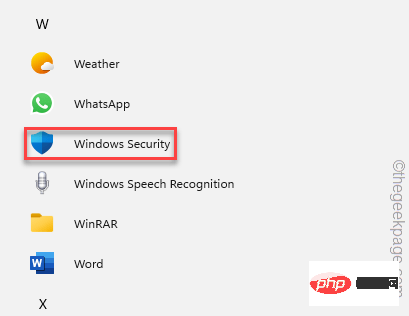
2. When the Windows Security page opens, click on the "Virus & Threat Protection" setting.
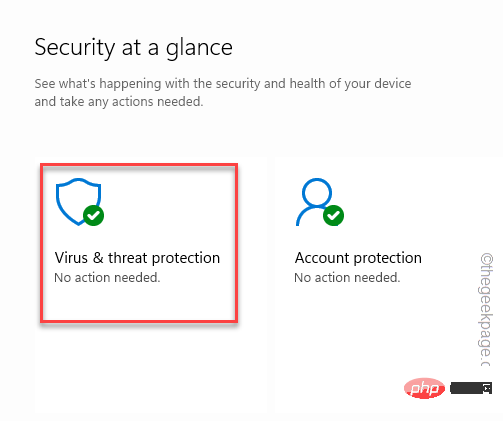
#3. On the next page, you will see the results of previous scans and more options.
4. Here, just click on "Scan Options" to access it.
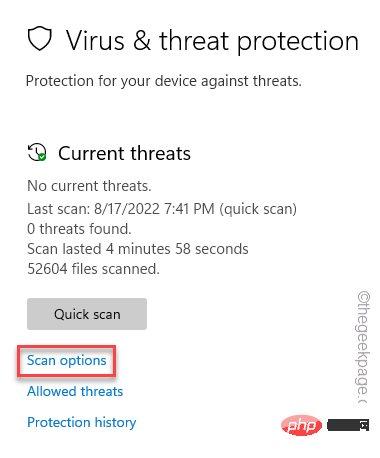
7. Now, select "Full Scan" and click on the "Scan Now" button to run a complete system-wide scan .
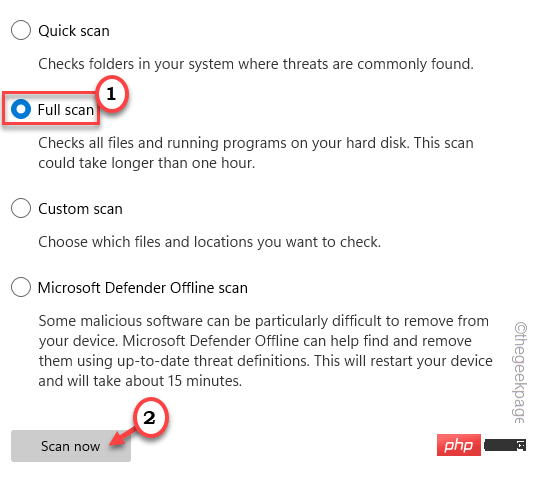
The scan time may vary depending on the number of files and folders you have.
If Windows Security Center detects any malware infection, you may have to restart your system so that Windows can quarantine and permanently remove it.
Hope this helps.
Fix 4 – Disable overclocking function
Overclocking also means overheating. If you have enabled it, disable it.
1. Press the Win key and I key simultaneously.
2. When the settings window opens, click "System".
3. After that, scroll and click on "Restore".
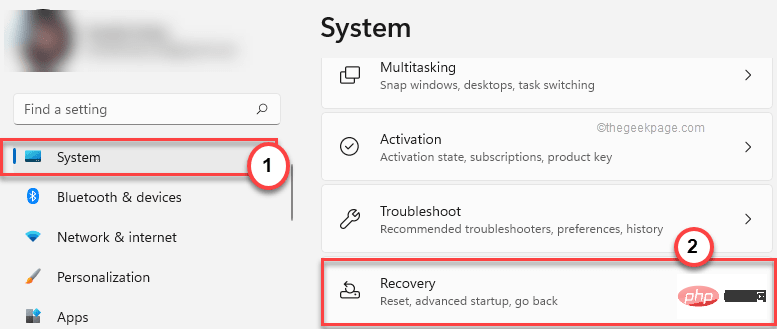
#4. Later, click "Restart Now" in the Advanced Startup section.
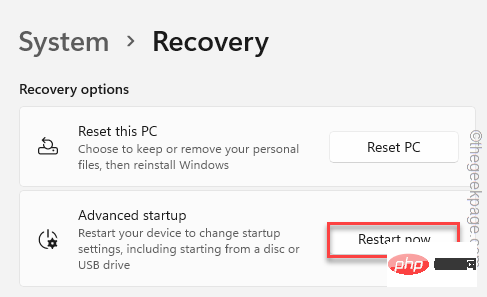
This will reboot the system.
5. Just click "Troubleshoot" to continue.
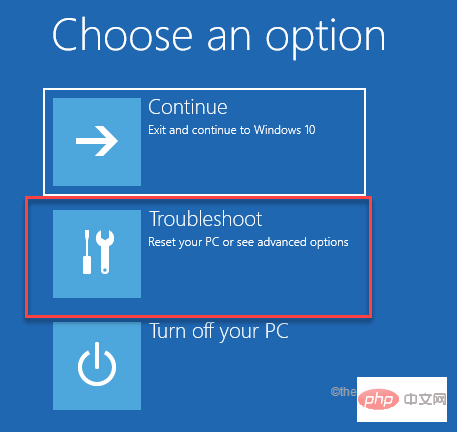
6. Next, just click on “Advanced Options” to enter the next settings page.
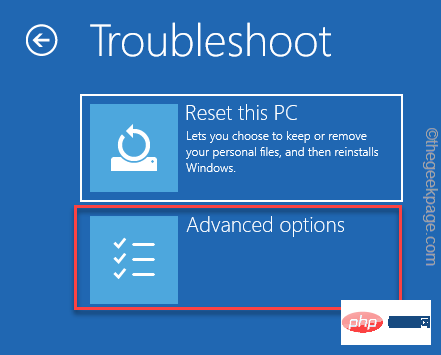
7. You have to click on “UEFI Firmware Settings”.
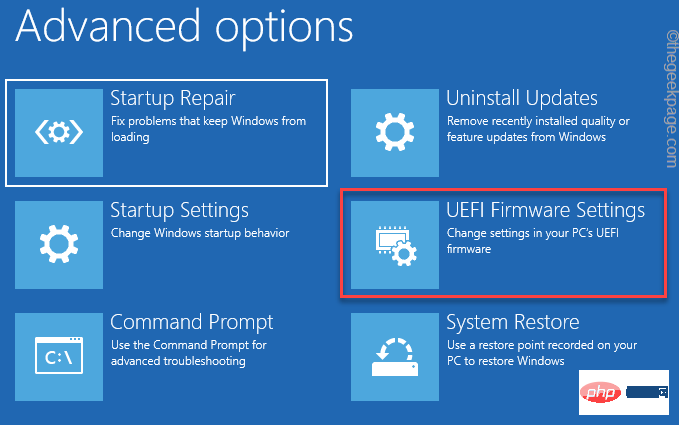
8. Now, click " Restart " to restart the system and open the BIOS settings.

9. Now, go to the "Performance" tab.
10.Here, look for the “Overclocking” option. Select it and set it to "Disable" mode.
Now, save the settings and exit the BIOS page.
11. Return to the homepage and click "Continue".
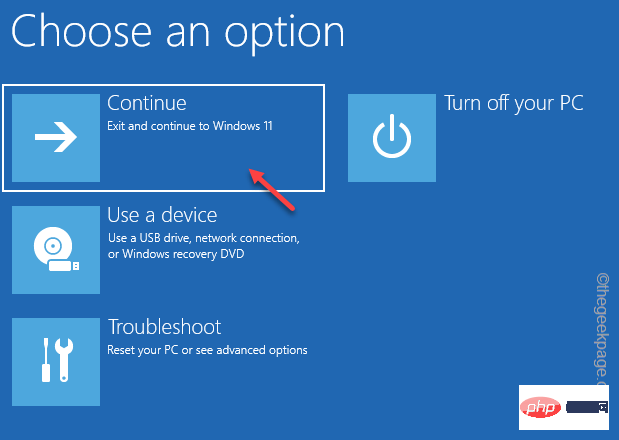
Once the system boots up, you won't have thermal trip issues at all.
Fix 5 – Check CPU Temperature
Ideally, the CPU operates within a defined temperature range. Check the temperature reading yourself.
For PC computers, the idle CPU temperature is 49°C and the maximum temperature should be around 79°C. In the case of laptops, the higher range can reach 90°C.
1. Visit the CoreTemp website.
2. Now, click "Download" to download the CoreTemp installer.

3. Then, double-click " Core-Temp-setup" to access it.
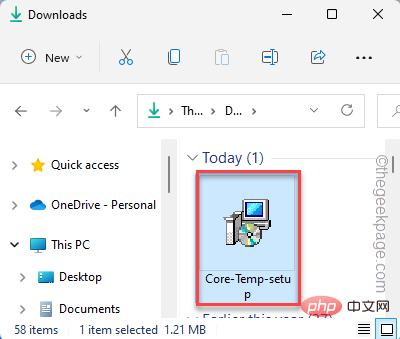
#4. Now, just follow the on-screen instructions to complete the last step.
5. Then, click "Install" to start installing the tool.
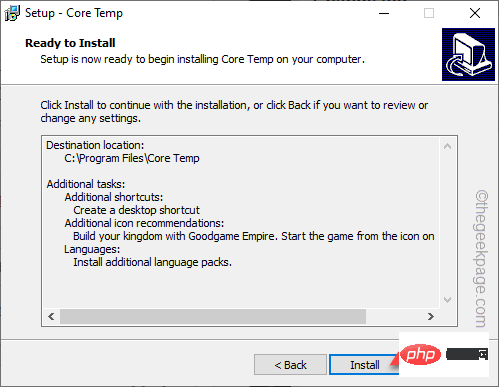
Come to the completion step, click "Complete" to complete the step.
CoreTemp should start automatically. If not, start the tool.
1. Once CoreTemp is turned on, check the temperature and load of each core.
2. If you find that the maximum temperature exceeds 65°C, despite applying all the fixes on this page, you should consult a technician.
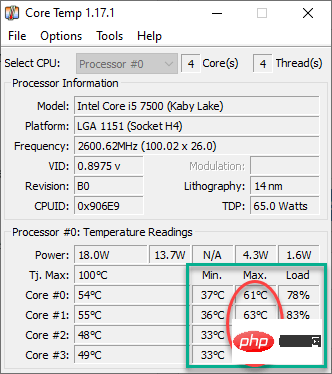
Fix 6 – Set a high-performance power plan
You can set the system power plan to high-performance mode.
1. First, press the Windows key and R key at the same time.
2. Then, Type it and click "OK".
电源配置文件
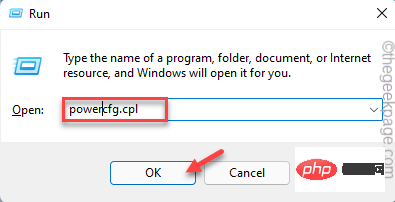
3. When the control panel opens, click "Show additional plans".
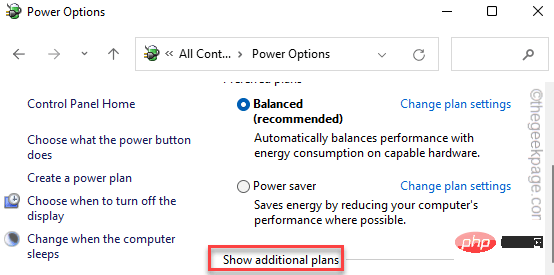
4. After that, select the "High Performance" mode.
[
Note – There is an additional option to use the “ Ulitmate Performance ” mode if desired. To enable this hidden power plan on your system, follow the steps mentioned in our tutorial.
]
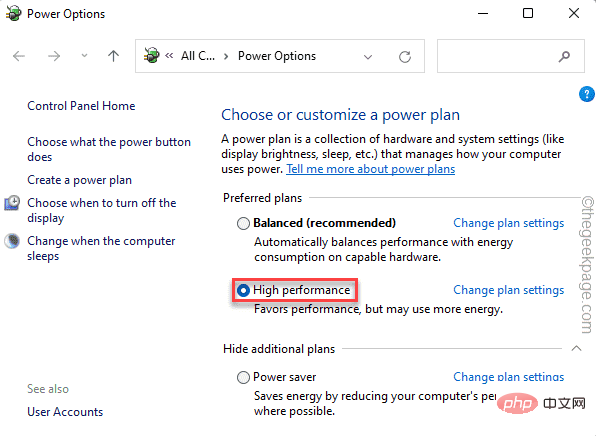
You can close the control panel page. Now, play the game and test it out. Your system will no longer trip due to heat.
Additional Tips–
1. You should increase your system RAM. If you have 4 GB, you should upgrade it to 8 GB.
2. You should replace the thermal paste on the heat sink. It can significantly reduce CPU temperature. Typically, thermal paste lasts 3 years. So if your PC is older than this, call a technician or you can reapply thermal paste yourself.
The above is the detailed content of How to Fix Thermal Trip Error on Windows 11/10. For more information, please follow other related articles on the PHP Chinese website!

Hot AI Tools

Undresser.AI Undress
AI-powered app for creating realistic nude photos

AI Clothes Remover
Online AI tool for removing clothes from photos.

Undress AI Tool
Undress images for free

Clothoff.io
AI clothes remover

Video Face Swap
Swap faces in any video effortlessly with our completely free AI face swap tool!

Hot Article

Hot Tools

Notepad++7.3.1
Easy-to-use and free code editor

SublimeText3 Chinese version
Chinese version, very easy to use

Zend Studio 13.0.1
Powerful PHP integrated development environment

Dreamweaver CS6
Visual web development tools

SublimeText3 Mac version
God-level code editing software (SublimeText3)

Hot Topics
 1663
1663
 14
14
 1419
1419
 52
52
 1313
1313
 25
25
 1264
1264
 29
29
 1237
1237
 24
24
 What is the reason why PS keeps showing loading?
Apr 06, 2025 pm 06:39 PM
What is the reason why PS keeps showing loading?
Apr 06, 2025 pm 06:39 PM
PS "Loading" problems are caused by resource access or processing problems: hard disk reading speed is slow or bad: Use CrystalDiskInfo to check the hard disk health and replace the problematic hard disk. Insufficient memory: Upgrade memory to meet PS's needs for high-resolution images and complex layer processing. Graphics card drivers are outdated or corrupted: Update the drivers to optimize communication between the PS and the graphics card. File paths are too long or file names have special characters: use short paths and avoid special characters. PS's own problem: Reinstall or repair the PS installer.
 How to speed up the loading speed of PS?
Apr 06, 2025 pm 06:27 PM
How to speed up the loading speed of PS?
Apr 06, 2025 pm 06:27 PM
Solving the problem of slow Photoshop startup requires a multi-pronged approach, including: upgrading hardware (memory, solid-state drive, CPU); uninstalling outdated or incompatible plug-ins; cleaning up system garbage and excessive background programs regularly; closing irrelevant programs with caution; avoiding opening a large number of files during startup.
 How to solve the problem of loading when PS is always showing that it is loading?
Apr 06, 2025 pm 06:30 PM
How to solve the problem of loading when PS is always showing that it is loading?
Apr 06, 2025 pm 06:30 PM
PS card is "Loading"? Solutions include: checking the computer configuration (memory, hard disk, processor), cleaning hard disk fragmentation, updating the graphics card driver, adjusting PS settings, reinstalling PS, and developing good programming habits.
 Does mysql need the internet
Apr 08, 2025 pm 02:18 PM
Does mysql need the internet
Apr 08, 2025 pm 02:18 PM
MySQL can run without network connections for basic data storage and management. However, network connection is required for interaction with other systems, remote access, or using advanced features such as replication and clustering. Additionally, security measures (such as firewalls), performance optimization (choose the right network connection), and data backup are critical to connecting to the Internet.
 Is slow PS loading related to computer configuration?
Apr 06, 2025 pm 06:24 PM
Is slow PS loading related to computer configuration?
Apr 06, 2025 pm 06:24 PM
The reason for slow PS loading is the combined impact of hardware (CPU, memory, hard disk, graphics card) and software (system, background program). Solutions include: upgrading hardware (especially replacing solid-state drives), optimizing software (cleaning up system garbage, updating drivers, checking PS settings), and processing PS files. Regular computer maintenance can also help improve PS running speed.
 Is PS slow loading related to other programs that are running?
Apr 06, 2025 pm 06:03 PM
Is PS slow loading related to other programs that are running?
Apr 06, 2025 pm 06:03 PM
The secrets to mastering Office software include: understanding different versions and platforms, correctly installing and configuring, proficient in using the software interface, in-depth understanding of feature operations, application collaboration and sharing functions, utilizing templates and styles, mastering advanced skills, and solving common problems. In addition, you need to choose a version that suits your needs, make good use of templates and styles, develop backup habits, and learn shortcut keys and advanced techniques to improve efficiency.
 How to solve the problem of loading when the PS opens the file?
Apr 06, 2025 pm 06:33 PM
How to solve the problem of loading when the PS opens the file?
Apr 06, 2025 pm 06:33 PM
"Loading" stuttering occurs when opening a file on PS. The reasons may include: too large or corrupted file, insufficient memory, slow hard disk speed, graphics card driver problems, PS version or plug-in conflicts. The solutions are: check file size and integrity, increase memory, upgrade hard disk, update graphics card driver, uninstall or disable suspicious plug-ins, and reinstall PS. This problem can be effectively solved by gradually checking and making good use of PS performance settings and developing good file management habits.
 Can mysql run on Windows
Apr 08, 2025 pm 01:54 PM
Can mysql run on Windows
Apr 08, 2025 pm 01:54 PM
Running MySQL on Windows is feasible, but challenges such as port conflicts, permission issues, and environment variable settings need to be considered. Installation issues can be solved by customizing configuration files, adjusting user permissions, and setting environment variables correctly. Additionally, the appropriate storage engine should be selected, tweaked configuration files, and SSDs should be used to optimize performance.



